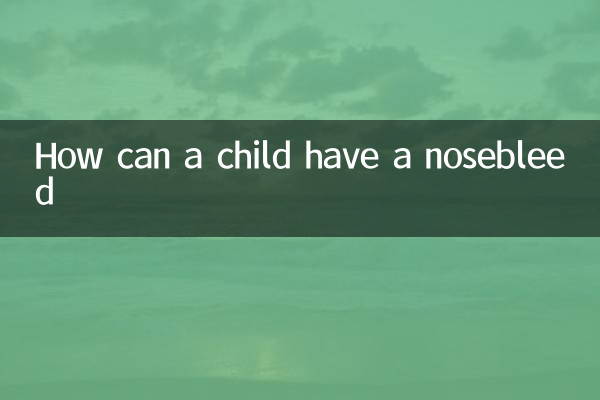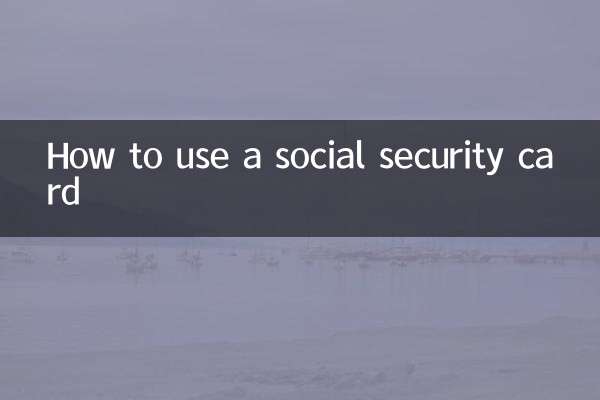How can a child have a nosebleed
In the past 10 days, the topic of children's health has continued to heat up on major social platforms and news websites, among which "children's nosebleed" has become the focus of hot discussion among parents. This article will analyze this phenomenon in detail from the aspects of reasons, treatment methods, preventive measures and related data statistics.
1. Common causes of nosebleed in children

There are many causes of nosebleeds in children. Here are the reasons mentioned most in recent hot discussions:
| reason | Percentage | Detailed description |
|---|---|---|
| Air drying | 35% | The air humidity is low in autumn and winter, and the nasal mucosa is prone to dryness, rupture and bleeding. |
| Pick your nose | 25% | Children habitually pick their noses, resulting in damage to the nasal mucosa. |
| trauma | 15% | Collision or fall while playing, causing rupture of the nasal blood vessels. |
| Allergies or colds | 10% | Nasal inflammation or frequent blowing of nose can cause mucosal bleeding. |
| Other reasons | 15% | Including rare cases such as blood diseases and nasal septum deviated. |
2. How to deal with nosebleed in children
Recently, many parents have shared their experience in dealing with nosebleeds in their children on social platforms. Here are the correct treatments certified by doctors:
1.keep Calm: Soothe the child's emotions and avoid crying and aggravating bleeding.
2.Correct posture: Let the child lean forward a little and breathe with his mouth to avoid blood reflux and choke.
3.Compression to stop bleeding: Pinch both sides of the nose with your fingers (soft nose part) for 5-10 minutes.
4.Cold compress: Apply an ice bag or a cold towel to the forehead or nose bridge to help blood vessels contract.
5.Follow-up observation: Avoid strenuous exercise after stopping the bleeding. If bleeding continues or frequent attacks, you need to seek medical attention.
3. Measures to prevent nosebleeds in children
According to recent parenting bloggers’ suggestions, preventing nosebleeds in children can start from the following aspects:
| Preventive measures | Effectiveness | Specific methods |
|---|---|---|
| Keep your nasal moist | high | Use saline spray or apply Vaseline. |
| Correct the nose picking habit | middle | Guide children to get rid of bad habits through picture books or games. |
| Increase air humidity | high | Use a humidifier to keep the indoor humidity between 50% and 60%. |
| Diet conditioning | middle | Drink more water and supplement vitamin C and K. |
| Avoid strenuous exercise | Low | Pay attention to protecting your nose during strenuous exercise. |
4. Recent hot events
1."Dry weather causes frequent nosebleeds in children": Many places in the north reported that indoor dryness caused by heating, and the number of nosebleeds in kindergartens increased.
2."Evaluation of Internet celebrity nosebleeding artifact": A blogger on a short video platform compared a variety of hemostatic products, which caused heated discussion among parents.
3."Pediatricians online Q&A": The director of the pediatric department of a tertiary hospital answered the nosebleed question live, with a viewing volume of over one million.
5. Common questions and answers to parents
Q: Do you need to raise your head when you have a nosebleed?
A: No need! Reciting your head can cause blood to flow back into the throat, which may cause choking and even vomiting.
Q: Can a nosebleed be stuffed with tissue?
A: Not recommended. Rough tissues may rub against the mucosa, so it is recommended to use special hemostatic cotton or clean gauze.
Q: Do I need to have a checkup for frequent nosebleeds?
A: If you have nosebleeds more than 3 times a month, or if you have a single bleeding for more than 20 minutes, it is recommended to seek medical examination.
6. Summary
Although nosebleeds in children are common, it is crucial to properly handle and prevent them. By analyzing recent hot topics and expert suggestions, we understand that nosebleeds are not scary in most cases. The key is to master the correct treatment methods and take daily prevention. If the child has frequent nosebleeds or is accompanied by other symptoms, seek medical treatment in time to check for the underlying cause.
Recently, the topic of children's health has continued to attract attention. It is recommended that parents pay more attention to popular science content from authoritative medical institutions to avoid being misled by misinformation on the Internet. Scientific parenting starts with understanding these little common sense.

check the details

check the details